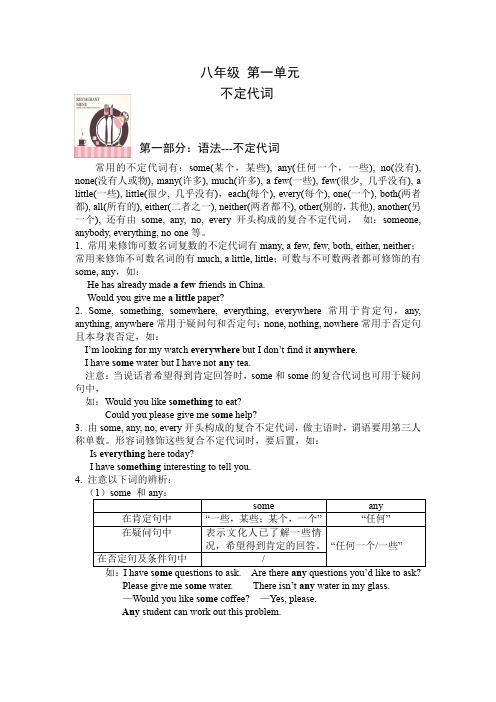不定代词
- 格式:ppt
- 大小:582.50 KB
- 文档页数:12

不定代词知识点
不定代词是不指明代替任何特定名词或形容词的代词。
常用的不定代词有:some(something,somebody,someone,somewhere),any (anything,anybody,anyone,anywhere),no(nothing,nobody,no one),every(everything,everybody,everyone,everywhere),all,each,both,much,many,(a)little,(a)few,other(s),another,none,one,either,neither等。
一般情况下,some构成的复合不定代词用于肯定句;any构成的复合不定代词用于否定句或疑问句;no构成的复合不定代词表示否定含义,用于否
定句。
当复合不定代词在句子中作主语时,谓语动词一般用单数形式。
另外,修饰不定代词的词要置于其后。
请注意,这只是一些不定代词的基本知识。
如果您有更具体的问题或需要深入了解其他相关概念,建议查阅语法书籍或咨询专业人士。

不定代词形式及用法不定代词是一类表示不确定身份或数量的代词,常常用来代替无法具体指明的人或物,或表示泛指、概括的概念。
不定代词在句子中起到替代名词的作用,能够帮助我们简化表达,增加语言的流畅性。
下面将介绍几种常见的不定代词形式及其用法。
一、some 和 any1. some: 表示某些,一些,通常用于肯定句中,并且可以用于肯定的问句,以期得到肯定回答。
例:I have some apples.(我有一些苹果。
)例:Would you like some tea?(你想来点茶吗?)2. any: 表示任何,任一,常用于否定句和疑问句中,或在表示否定意义的问句中,以期得到否定回答。
例:I don't have any money.(我没有任何钱。
)例:Are there any books on the table?(桌子上有没有书?)二、someone,somebody,anyone,anybody1. someone / somebody: 表示某个人,有时也可指代匿名的人,相当于“某人”或“有人”。
例:Someone left a message for you.(有人给你留言了。
)例:Could somebody help me with this?(有人可以帮助我处理这个问题吗?)2. anyone / anybody: 表示任何人,任何人都可以,通常用于否定句和疑问句中。
例:I don't know anyone here.(我不认识这里的任何人。
)例:Does anybody have a pen I can borrow?(有人有一支我可以借用的钢笔吗?)三、something,anything,nothing1. something: 表示某事,某物,通常用于肯定句中,有时也可指代匿名的事物。
例:I need to buy something for dinner.(我需要买点东西做晚餐。

不定代词用法总结不定代词是在句子中代替特定人或物的词语,它们的使用能够让句子更加简洁明了。
下面是对不定代词的用法做一个总结。
1. 一般不定代词一般不定代词包括"something"、"anything"、"nothing"、"everything"等,它们用来代替不具体指向的事物。
例如:- I have something to tell you.- Is there anything I can do for you?- Don't worry, it's nothing serious.- She knows everything about that topic.2. 不定代词"some"和"any""some"和"any"可以用作不定代词,也可以用作不定代词,具体使用要根据句子的语境来确定。
当"some"用作不定代词时,表示肯定或推测的意思。
例如:- There are some books on the table.- Can I have some water, please?当"any"用作不定代词时,表示否定或疑问的意思。
- I don't have any money with me.- Do you have any ideas for the project?3. 不定代词"somebody"、"anybody"、"nobody"和"everybody"这些不定代词用来代替人。
它们的使用方式类似于前面提到的一般不定代词。
例如:- Somebody is waiting for you outside.- Nobody knows the answer.- Can anybody help me with this problem?- Everybody enjoyed the party.4. 不定代词"each"和"every""each"和"every"用来代替三者或多者中的每一个。

不定代词用法总结不定代词是英语语法中的一个重要部分,用于指代不明确的人、物、数量、时间等。
不定代词包括some、any、no、every、each、either、neither、few、several、many、much、other、another、one、none等。
掌握不定代词的使用方法对于学习英语语法和表达非常重要。
1. some/anySome和any都表示“一些”的意思,在不同的情境下有不同的使用方法。
a. some用于肯定的陈述句中,表示“一些,一部分”。
例:I have some friends in New York.b. any用于疑问句、否定句等语气较弱的句子中,表示“任何一些”。
例:Did you meet any interesting people at the party?2. noNo表示“没有”的意思,常用于否定句中。
例:There were no seats available on the train.3. everyEvery表示“每一个”的意思。
例:Every student is required to attend the meeting.4. eachEach表示“每一个”,用于强调个体。
例:Each student is responsible for his or her own progress.5. either/neitherEither表示“两者中的任何一个”,neither表示“两者都不”。
例:You can choose either the blue or the red dress.例:Neither of us likes to cook.6. few/several/many/much这些代词都用于表示数量或程度。
a. few表示“很少,几乎没有”。
例:There were few people in the park on such a hot day.b. several表示“几个,若干”。


第一部分:语法---不定代词常用的不定代词有:some(某个,某些), any(任何一个,一些), no(没有),none(没有人或物), many(许多), much(许多), a few(一些), few(很少, 几乎没有), alittle(一些), little(很少, 几乎没有),each(每个), every(每个), one(一个), both(两者都), all(所有的), either(二者之一), neither(两者都不), other(别的,其他), another(另一个), 还有由some, any, no, every 开头构成的复合不定代词, 如:someone,anybody, everything, no one 等。
1. 常用来修饰可数名词复数的不定代词有many, a few, few, both, either, neither ;常用来修饰不可数名词的有much, a little, little ;可数与不可数两者都可修饰的有some, any ,如:He has already made a few friends in China.Would you give me a little paper?2. Some, something, somewhere, everything, everywhere 常用于肯定句,any,anything, anywhere 常用于疑问句和否定句;none, nothing, nowhere 常用于否定句且本身表否定,如:I’m looking for my watch everywhere but I don’t find it anywhere .I have some water but I have not any tea.注意:当说话者希望得到肯定回答时,some 和some 的复合代词也可用于疑问句中,如:Would you like something to eat?Could you please give me some help?3. 由some, any, no, every 开头构成的复合不定代词,做主语时,谓语要用第三人称单数。
∙不定代词:即不指明代替任何特定名词或形容词的代词。
初中常用不定代词有:some(something,somebody,someone),any(anything,anybody,anyone),no (nothing,nobody,no one),every(everything,everybody,everyone,),all,each,both,much,many,(a)little,(a)few,other(s),another,none,one,either,neither等。
一般来讲,修饰不定代词的词要置于其后。
∙不定代词用法例举:①一般用于肯定句中的不定代词:some, someone, somebody, something例如:They can speak some Japanese.②一般用于否定句、疑问句和条件句中的不定代词:any, anyone, anybody, anything例如:Is there anyone at home?③一般用于句中表示否定意义的不定代词:no, no one, nobody, nothing例如:I have no watch.There is nothing wrong with the machine.④不定代词one指代可数名词,既可指人,亦可指物,它可以代替上文中出现的单数可数名词,指代复数名词时可以用ones。
例如:I do not have a pen, can you lend me one?I like small cars better than large ones.⑤none通常只用作名词,在句中作主语、宾语等。
意为“没有任何(人或物)”,既可指人,亦可指物。
none后常跟of短语,其后用复数可数名词或不可数名词。
例如:None of them knows the answer to the question.⑥both, allboth指两个人、物或群体;all指三个以上的人、物或群体或泛指一切事物。
1.不定代词:(the indefinite pronoun)不定代词是:不指明代替任何特定名词的代词。
不定代词有:some\ any\both\all\either\neither\none\all\other\others\another\one\each\every\few\a few\little\a little1. some,any 一些(人或物)。
any 还有“任何(人或物)”之意。
some一般用于陈述句,any多用于否定句、疑问句;如:Some of us can use computer.Some say yes, and some say no.The apples are nice. Do you have some?Are any of them yours?I don't know any of them.2. both, all, either, neither, noneboth:两者(都)...,all:所有的人(或物)none没有人或物(三个人或物当中) ,用作单数either:两者中任一个;neither:两者中没有一个both:两者(都)...看做复数如:Both of his parents are ill. 你们俩全对。
(both说明只有两人)Both of them aren't very beautiful.(并不是他俩都漂亮)either: 看作单数如:Either of us may(情态动词)join the party. 你们(两人)中任何一个可以参加聚会。
Come to my home on Friday or Saturday. Either of them is ok.周五或周六来我家吧。
这两天中,哪天都行。
There's coffee or tea - you can(情态动词)have either (of them).咖啡或茶──你可以任选一种。
不定代词基本用法1. 不定代词大都可以在句中作主语、宾语、表语、定语,起着名词和形容词的作用。
例如:Both of them are doctors. 他们两人都是医生。
(作主语)I saw nothing in the box. 我看到盒子里什么也没有。
(作宾语)It is something strange. 那是很奇怪的事情。
(作表语)There is a little juice in the glass. 玻璃杯里有一些果汁。
(作定语)Could you come a little earlier? (不同提法,a little可以理解为相当于副词作状语)2. 如果主语是不定代词some-(something,somebody,someone),any-(anything,anybody,anyone),No-(nothing,nobody,no one),every-(everything,everybody,everyone-),a (little), less, , much, one,another,nobody, nothing, neither, each,either 等时,谓语动词用单数形式。
例如:There is little water in the glass. Please bring me more. 杯子里没有水了,请再给我取点。
Nobody is ready to help me. 没有人准备帮我。
3. 如果主语是several,both, many,(a)few,others 等时谓语动词用复数。
例如:Both of them are doctors. 他们两个都是医生。
4. 如果主语是all, none, some, any, such, more, most等时谓语动词用单数或复数要根据实际情况而定。
例如:All the books are mine. 所有这些书都是我的。
不定代词不明确指代某个特定名词的代词叫作不定代词。
根据所表达的意义,不定代词可以分为两大类,即肯定性不定代词和否定性不定代词。
肯定性不定代词有:both,all,many,much,one,other,each,another,a few,a little,either,some(someone,somebody,something),any(anyone,anybody,anything),every(everyone,everybody,everything)。
否定性不定代词有:no,neither,none,nobody,nothing.除了需要掌握各个不定代词的意思外,你还得注意以下不定代词的辨析及中考考点!不定代词的区别.1.one与it 的区别One 代替同类事物中的一种. 而it代替上文中出现的某事物.This book is a good one . May I borrow it ?2.some与any 的区别一般情况下,some用于肯定句,any用于否定,疑问句,条件句中.但在表建议的疑问句中,仍用some 代any. 常用于could / would / May 开头或what about /how about …. 的句中。
May I have some water ?He asked me for some paper , but I didn’t have any .3.many与much的区别Many+可数名词的复数 Much+不可数名词都相当于 a lot of +复数名词/不可数名词注:a lot of 不能用于否定句中. 否定句中用many /much .4.a few /few /a little /little 的区别The story is easy to read . there are _____ new words in it .Hurry up ! There is _____ time left .5.each / every 的区别each 表示两者或两者以上的人或物中的每一个.而every 表示三者或三者以上的人或物中的每一个.There are trees and frowers on _____ side of the street .______ student has read a story .注:each 可以与of 连用, each of 作主语时,谓语动词用单数.而every 不能与of 连用.只能放在名词前作定语.Each of us _______(study )hard .6.no one 与none 的区别no one 表示没有人, 不能与of 连用. 而none of +复数名词/ 代词,作主语时,谓语常用单数。